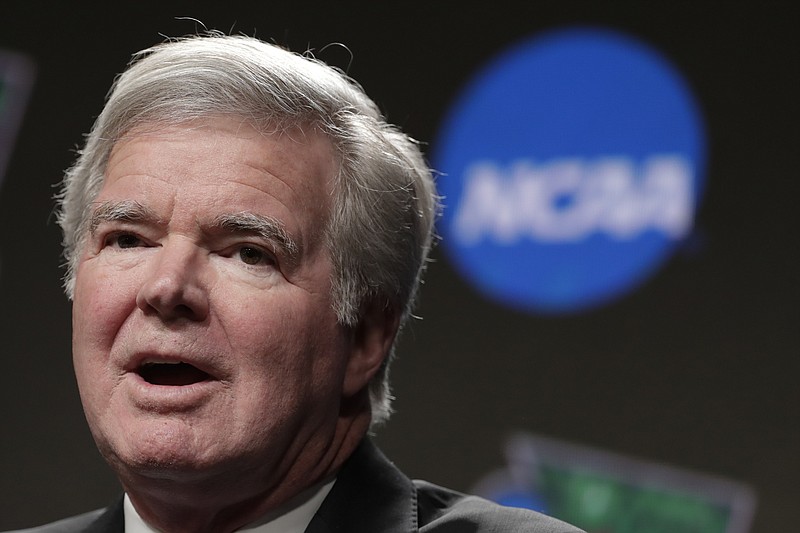If the National Collegiate Athletic Association was a basketball team, it would be the Washington Generals, the perennial doormat of the Harlem Globetrotters.
The Generals once lost 2,495 straight games to the Globetrotters and after Monday's unanimous Supreme Court ruling went against the NCAA as it pertains to Division I universities buying laptops - among other things - for athletes, it would seem at least somewhat possible that inept NCAA president Mark Emmert and his misguided minions could pile up at least that many consecutive defeats moving forward.
What's that line about the definition of insanity is doing the same thing over and over while expecting a different result?
That's the NCAA. It keeps attempting to embrace its sham-ateurism model from the 1950s and '60s and '70s despite almost every case it's had to defend in court going against it. Moreover, the court of public opinion has turned on it as well.
A nationwide Cygnal survey conducted in early May found that 58 percent of those questioned favored athletes being paid in some form or fashion.
And when you can get 58 percent of the people in this passionately divided land of ours to agree on anything, it is foolish of the NCAA not to listen and learn.
In truth, Monday's ruling could conceivably wind up having little to do with the upcoming Name, Image and Likeness debate raging in both the halls of Congress and numerous state houses. This particular case - the NCAA versus Alston - wasn't about Tommy Touchdown receiving money to endorse a tire store in the college town where he plays.
This was about academic-related expenses, such as laptops, a study abroad and internships, though other than the laptops, most who know of coaches' demands on athletes might wonder where they could find the time to study abroad or embrace an internship for more than a few weeks each summer.
What's more interesting is that the high court saw these expenses as just compensation and a permissible recruiting tool.
So you can already see where this is going. Let's say Jimmy Jumpshot's little sister needs a new laptop. Who's to know that the $1,700 Apple needed to get Jimmy to sign on the dotted line won't wind up in his sister's bedroom? If anyone thinks college coaches around the country aren't already figuring out ways to circumvent the spirit of the ruling in favor of a recruiting edge, they probably also think those same coaches never break the 20-hour (a week) work rule with their athletes.
Moreover, while Judge Neil Gorsuch wrote the court's official opinion, it was Justice Brett Kavanaugh, who once played for the Yale junior varsity basketball team, whose personal opinion most signals trouble for the NCAA moving forward.
Wrote Kavanaugh, his words sure to drive the Name, Image, Likeness debate, if nothing else, moving forward: "Nowhere else in America can businesses get away with agreeing not to pay their workers a fair market rate on the theory that their product is defined by not paying their workers a fair market rate The NCAA is not above the law The NCAA's business model would be flatly illegal in almost any other industry in America."
Kavanaugh also wrote: "The bottom line is that the NCAA and its member colleges are suppressing the pay of student athletes who collectively generate billions of dollars in revenues for colleges every year But the student athletes who generate the revenues, many of whom are African American and from lower-income backgrounds, end up with little or nothing."
How potentially game-changing those words (though, again, this ruling had officially nothing to do with the NIL debate)?
Merely consider the following quote from plaintiffs attorney Steve Berman, who is also leading a lawsuit that challenges any limits the NCAA can place on name, image and likeness opportunities for student-athletes. Berman told ESPN on Monday: "In light of Justice Kavanaugh's comments, we're rethinking whether we should once again challenge pay for play. Kavanaugh is suggesting you should go after everything."
Everything. If that becomes the norm, last athletic department in the black turn out the lights.
Yet the simple fact that Emperor Emmert and the NCAA's member schools have let it come to this is almost unfathomable, except that it's the NCAA.
After all, this wasn't some liberal-leaning court that just emasculated Emmert and his organization. This is one of the most outwardly conservative courts in decades, and certainly one that might be expected to cling to the status quo, refusing to hear the case, as it did in a case several years ago involving former UCLA basketball star Ed O'Bannon as well as all-time NBA greats Oscar Robertson and Bill Russell.
Instead, it has seen through the NCAA's arrogance, obstinance and wrong-headedness with 20/20 clarity and a seeming determination to bring it both to its knees and to justice long overdue.
When a conservative court unanimously hammers a 115-year-old American institution, as the NCAA is, it's time for that institution's 357 Division I athletic departments - the only ones affected by the ruling - to prepare to invest in more than laptops and study trips abroad.
It's time to invest in a new NCAA president.
Contact Mark Wiedmer at mwiedmer@timesfreepress.com.
